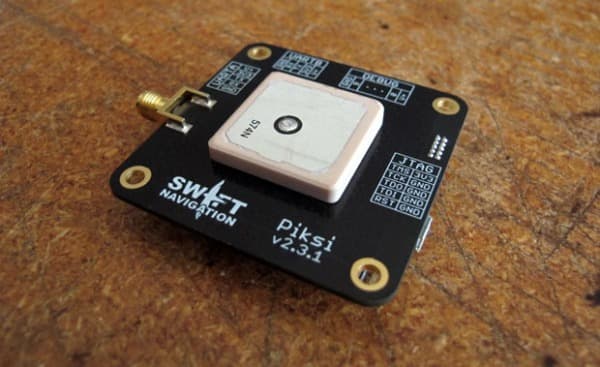Piksi: A Low-Cost Open Source RTK GPS Receiver That Is Accurate Max
Every smartphone and even some feature phones support positioning, while the ‘dumb’ phones rely on Wi-Fi or network triangulation the smart ones use satellite supported services like GPS or GLONASS. Even though these services provide good results they lack in precision. So to remove this drawback RTK (Real Time Kinematic) GPS was introduced, which has centimetre level precision as compared to the conventional ones which have an accuracy of a few meters. The RTK GPS technology has not gained much public appeal due to its steep price tag, but all that is about to change with Piksi, a low cost and open source RTK GPS receiver developed by San Francisco based start-up Swift Navigation Inc.

The RTK GPS system provides accurate results because it overcomes the 300 meter bit-length and delay caused by the ionosphere. To obtain centimetre level precision the RTK GPS system not only measures the code phase but also the phase of the carrier wave that the code is modulated upon because the carrier has a wavelength of about 19 centimetres. Ionosphere delay is corrected with the help of additional reference receiver. The Piksi is being considered an important innovation not only for its price but also for its open source software. Along with their home grown Python coded GPS post-processing tool, Peregrine the company will be releasing development tools for Linux, Windows and OSX platforms. The project has been well received by the public as it has managed to garner 48,732 US dollars from 109 backers in their #-Link-Snipped-#. This $900 priced system has been targeted for at researchers and manufacturers who can use this system for UAVs and autonomous vehicles.
Source: #-Link-Snipped-#

The RTK GPS system provides accurate results because it overcomes the 300 meter bit-length and delay caused by the ionosphere. To obtain centimetre level precision the RTK GPS system not only measures the code phase but also the phase of the carrier wave that the code is modulated upon because the carrier has a wavelength of about 19 centimetres. Ionosphere delay is corrected with the help of additional reference receiver. The Piksi is being considered an important innovation not only for its price but also for its open source software. Along with their home grown Python coded GPS post-processing tool, Peregrine the company will be releasing development tools for Linux, Windows and OSX platforms. The project has been well received by the public as it has managed to garner 48,732 US dollars from 109 backers in their #-Link-Snipped-#. This $900 priced system has been targeted for at researchers and manufacturers who can use this system for UAVs and autonomous vehicles.
Source: #-Link-Snipped-#
0
